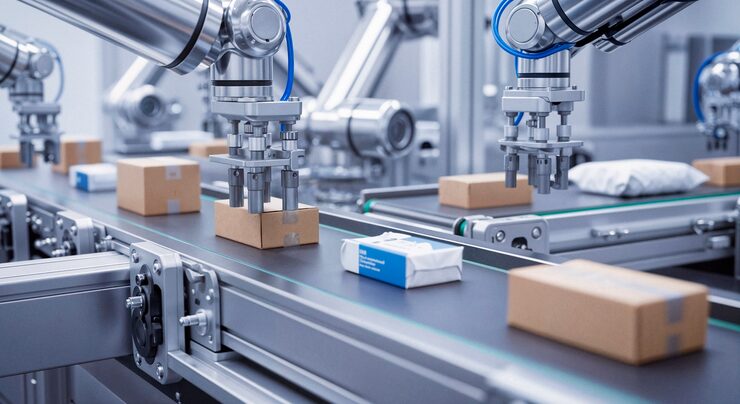Manufacturing automation solutions are revolutionizing the way industries operate by combining advanced technologies with smart systems that streamline production and reduce human error. In today’s fast-paced industrial landscape, businesses can no longer rely solely on manual processes if they want to stay competitive.
Every major industry, from automotive to pharmaceuticals, is embracing automation as a core strategy. It’s not just about replacing repetitive tasks but about creating smarter workflows where machines, sensors, and software collaborate with human expertise. The result is a system that produces higher output, fewer errors, and improved safety.
Why Manufacturing Automation Solutions Matter Today
In the past, factories were heavily dependent on manual labor, making them prone to inefficiencies and inconsistencies. With the arrival of manufacturing automation solutions, the shift has been dramatic.
Consider a mid-sized electronics company that used to struggle with delays in assembly due to human error. After investing in automation, they reduced production time by almost 40%. This not only lowered costs but also helped them deliver faster to global markets.
In an era where customer expectations are higher than ever, speed, precision, and flexibility are crucial. That’s why automation is no longer an option—it’s a necessity.
The Core of Manufacturing Automation Solutions
At the heart of automation is the integration of machines, robotics, AI-driven software, and IoT systems. Together, these components create a connected factory where data flows seamlessly between production lines and management systems.
Imagine sensors detecting machine downtime before it happens, or robots adjusting speed based on real-time demand. These small but critical details define the power of manufacturing automation solutions. They create a loop of continuous improvement where every process becomes more efficient with time.
Manufacturing Automation Solutions in Action
Real-world applications show just how transformative these systems can be. A leading automotive company introduced robotic arms for precision welding. Previously, errors were common, leading to costly reworks. After automation, accuracy improved significantly, production sped up, and workplace accidents dropped.
Another example comes from the food processing industry. Automation allowed them to sort, pack, and label products at lightning speed while maintaining strict hygiene standards. These changes not only boosted output but also strengthened compliance with health regulations.
Key Benefits of Manufacturing Automation Solutions
Businesses that adopt automation experience a wide range of advantages. The most obvious is efficiency. Machines can work tirelessly, ensuring 24/7 productivity.
Another benefit is cost reduction. Although initial investment may seem high, the long-term savings are immense. Reduced wastage, lower labor costs, and fewer errors translate into major financial gains.
Safety is also improved. Dangerous and repetitive tasks are handled by machines, allowing workers to focus on roles that require decision-making, creativity, and supervision.
How Manufacturing Automation Solutions Improve Quality
Quality control has always been a challenge in traditional manufacturing. Automation addresses this issue by standardizing processes. Sensors and vision systems inspect products with microscopic accuracy, ensuring every item meets quality standards.
Take the example of a pharmaceutical plant where even a minor error can lead to massive recalls. With automation in place, each capsule is weighed, analyzed, and packaged under strict digital supervision. This ensures not only compliance with regulations but also trust among consumers.
Overcoming Challenges with Manufacturing Automation Solutions
Adopting new systems is not without challenges. Resistance from employees, high initial costs, and integration complexities are common hurdles.
However, companies that embrace change see remarkable outcomes. A textile factory once worried that automation would disrupt jobs. Instead, workers were trained to manage and supervise machines, leading to new roles and higher job satisfaction. Automation didn’t take jobs away; it redefined them.
Manufacturing Automation Solutions and Industry 4.0
The rise of Industry 4.0 has taken automation to a whole new level. It’s not just about machines anymore—it’s about intelligent, interconnected systems that learn and adapt.
With data analytics, predictive maintenance, and AI-driven insights, factories can now anticipate demand, prevent breakdowns, and respond quickly to market shifts. Manufacturing automation solutions are the backbone of this new era, where every decision is data-driven.
Manufacturing Automation Solutions for Small Businesses
There’s a misconception that only large corporations can afford automation. In reality, many small and medium-sized enterprises are adopting scalable solutions that fit their budget.
For instance, a small packaging company integrated simple robotic arms to handle repetitive tasks. This freed up workers for more creative roles, boosted output, and cut operational costs without overwhelming the business.
The accessibility of cloud-based automation tools has further leveled the playing field, giving smaller firms the ability to compete with industry giants.
Manufacturing Automation Solutions and Workforce Transformation
A big question often arises: What happens to workers? The truth is, automation doesn’t eliminate human involvement—it enhances it.
Employees are freed from monotonous tasks and can focus on strategy, creativity, and innovation. Training programs allow them to develop new skills in programming, machine supervision, and data analysis. This transformation creates a workforce that is more skilled, adaptable, and future-ready.
Long-Term Impact of Manufacturing Automation Solutions
The ripple effect of automation is immense. Companies enjoy higher profits, customers benefit from better products, and workers gain safer and more meaningful jobs. On a global scale, automation is reshaping supply chains, reducing carbon footprints, and driving sustainability.
Experts predict that in the coming decade, smart factories will become the norm rather than the exception. Manufacturing automation solutions are paving the way for industries to remain resilient in uncertain times while keeping innovation at the forefront.
Read also:
bangladesh national cricket team vs pakistan national cricket team match scorecard
kakupress.com
india national cricket team vs england cricket team timeline
australian men’s cricket team vs pakistan national cricket team match scorecard


